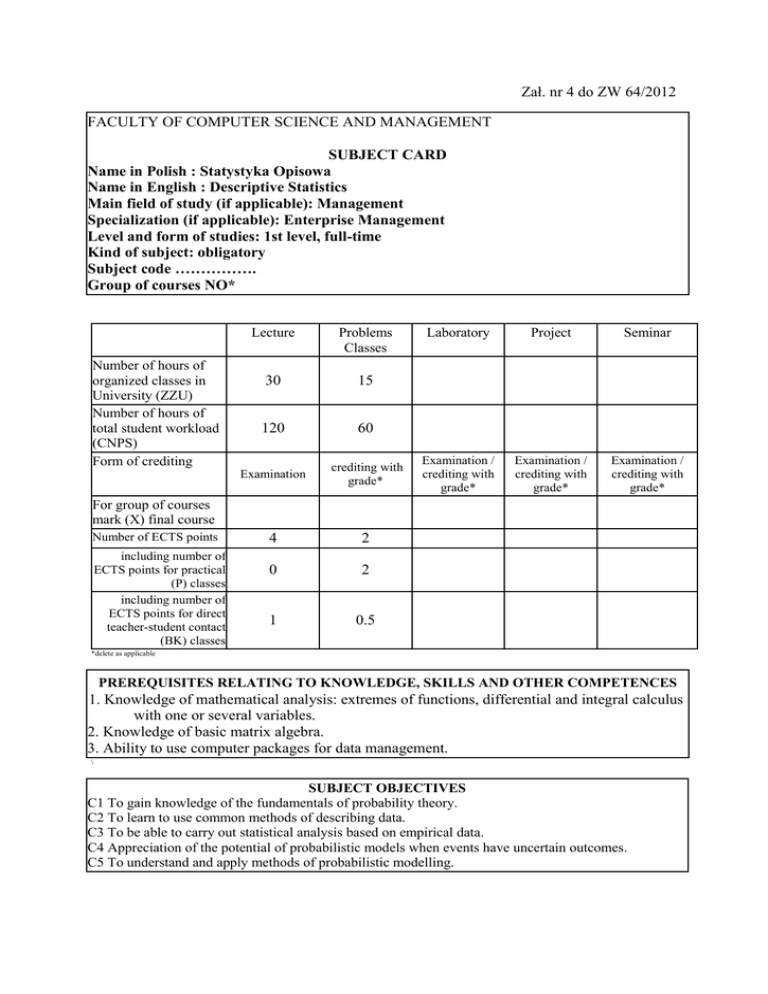Zał. nr 4 do ZW 64/2012 SUBJECT CARD
advertisement

Zał. nr 4 do ZW 64/2012 FACULTY OF COMPUTER SCIENCE AND MANAGEMENT SUBJECT CARD Name in Polish : Statystyka Opisowa Name in English : Descriptive Statistics Main field of study (if applicable): Management Specialization (if applicable): Enterprise Management Level and form of studies: 1st level, full-time Kind of subject: obligatory Subject code ……………. Group of courses NO* Number of hours of organized classes in University (ZZU) Number of hours of total student workload (CNPS) Form of crediting Lecture Problems Classes 30 15 120 60 Examination crediting with grade* 4 2 0 2 1 0.5 Laboratory Project Seminar Examination / crediting with grade* Examination / crediting with grade* Examination / crediting with grade* For group of courses mark (X) final course Number of ECTS points including number of ECTS points for practical (P) classes including number of ECTS points for direct teacher-student contact (BK) classes *delete as applicable PREREQUISITES RELATING TO KNOWLEDGE, SKILLS AND OTHER COMPETENCES 1. Knowledge of mathematical analysis: extremes of functions, differential and integral calculus with one or several variables. 2. Knowledge of basic matrix algebra. 3. Ability to use computer packages for data management. \ SUBJECT OBJECTIVES C1 To gain knowledge of the fundamentals of probability theory. C2 To learn to use common methods of describing data. C3 To be able to carry out statistical analysis based on empirical data. C4 Appreciation of the potential of probabilistic models when events have uncertain outcomes. C5 To understand and apply methods of probabilistic modelling. SUBJECT EDUCATIONAL EFFECTS relating to knowledge: PEK_W01 The student will know the basic tools of descriptive statistics and understand the fundamental concepts of probability theory. relating to skills: PEK_U01 The student will be able to analyze statistical data and interpret the results of such analysis. PEK_U02 The student will be able to construct simple probabilistic models useful in the management process. PEK_U03 The student will understand the need to consider appropriate probabilistic models in the analysis of statistical data. … relating to social competences: PEK_K01 The student will be able to make a critical appraisal of a probabilistic model describing simple socio-economic processes. PROGRAMME CONTENT Form of classes - lecture General population, sample, representative sample, random Lec 1 samples. Statistical data. Graphical and numerical presentation of statistical Lec 2 data. Measures of centrality and dispersion Lec 3-4 Probability spaces, elementary events, the axioms of probabililty, Bayes' laws, conditional probability, probability trees, independent events. Lec 5-6 Random variables, discrete distributions, expected value and variance, Poisson approximation to the binomial distribution. Lec 7-8 Continuous distributions Lec 9-10 Normal Distribution, the central limit theorem, normal approximation to the binomial distribution. Lec 11 Multivariate random variables. Marginal distributions. Independent random variables. Correlation Coefficient. Lec 12 Conditional distributions, probabilistic regression Lec 13 Simple random samples, applications of the central limit theorem Lec 14- Estimating the parameters of a distribution, method of moments, maximum likelihood estimation 15 Total hours Number of hours 2 2 4 4 4 4 2 2 2 4 30

